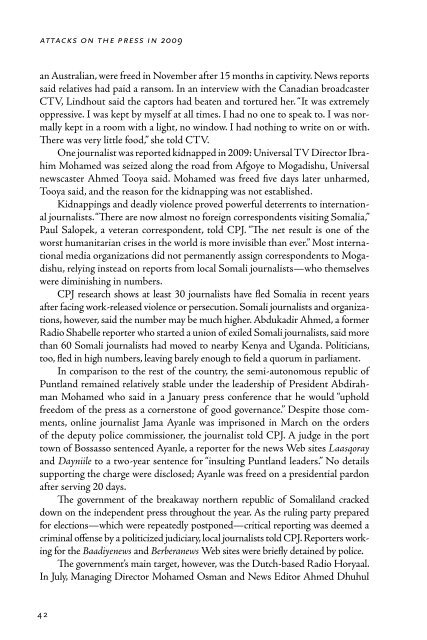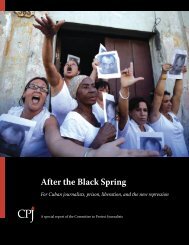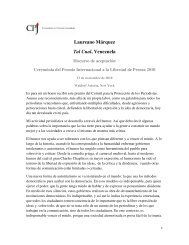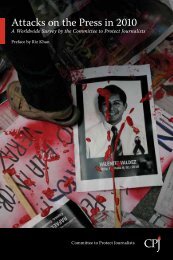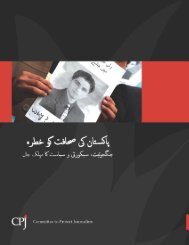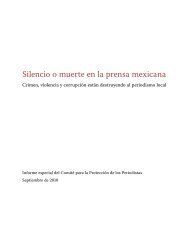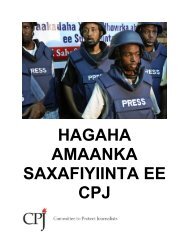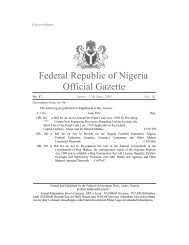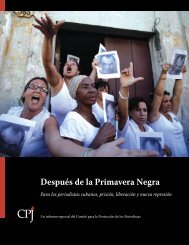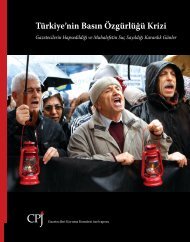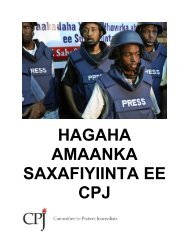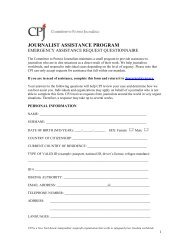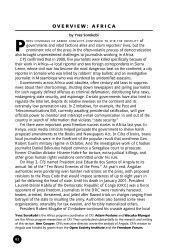Attacks on the Press - Committee to Protect Journalists
Attacks on the Press - Committee to Protect Journalists
Attacks on the Press - Committee to Protect Journalists
- No tags were found...
Create successful ePaper yourself
Turn your PDF publications into a flip-book with our unique Google optimized e-Paper software.
attacks <strong>on</strong> <strong>the</strong> press in 2009africa: ugandaan Australian, were freed in November after 15 m<strong>on</strong>ths in captivity. News reportssaid relatives had paid a ransom. In an interview with <strong>the</strong> Canadian broadcasterCTV, Lindhout said <strong>the</strong> cap<strong>to</strong>rs had beaten and <strong>to</strong>rtured her. “It was extremelyoppressive. I was kept by myself at all times. I had no <strong>on</strong>e <strong>to</strong> speak <strong>to</strong>. I was normallykept in a room with a light, no window. I had nothing <strong>to</strong> write <strong>on</strong> or with.There was very little food,” she <strong>to</strong>ld CTV.One journalist was reported kidnapped in 2009: Universal TV Direc<strong>to</strong>r IbrahimMohamed was seized al<strong>on</strong>g <strong>the</strong> road from Afgoye <strong>to</strong> Mogadishu, Universalnewscaster Ahmed Tooya said. Mohamed was freed five days later unharmed,Tooya said, and <strong>the</strong> reas<strong>on</strong> for <strong>the</strong> kidnapping was not established.Kidnappings and deadly violence proved powerful deterrents <strong>to</strong> internati<strong>on</strong>aljournalists. “There are now almost no foreign corresp<strong>on</strong>dents visiting Somalia,”Paul Salopek, a veteran corresp<strong>on</strong>dent, <strong>to</strong>ld CPJ. “The net result is <strong>on</strong>e of <strong>the</strong>worst humanitarian crises in <strong>the</strong> world is more invisible than ever.” Most internati<strong>on</strong>almedia organizati<strong>on</strong>s did not permanently assign corresp<strong>on</strong>dents <strong>to</strong> Mogadishu,relying instead <strong>on</strong> reports from local Somali journalists—who <strong>the</strong>mselveswere diminishing in numbers.CPJ research shows at least 30 journalists have fled Somalia in recent yearsafter facing work-released violence or persecuti<strong>on</strong>. Somali journalists and organizati<strong>on</strong>s,however, said <strong>the</strong> number may be much higher. Abdukadir Ahmed, a formerRadio Shabelle reporter who started a uni<strong>on</strong> of exiled Somali journalists, said morethan 60 Somali journalists had moved <strong>to</strong> nearby Kenya and Uganda. Politicians,<strong>to</strong>o, fled in high numbers, leaving barely enough <strong>to</strong> field a quorum in parliament.In comparis<strong>on</strong> <strong>to</strong> <strong>the</strong> rest of <strong>the</strong> country, <strong>the</strong> semi-aut<strong>on</strong>omous republic ofPuntland remained relatively stable under <strong>the</strong> leadership of President AbdirahmanMohamed who said in a January press c<strong>on</strong>ference that he would “upholdfreedom of <strong>the</strong> press as a cornerst<strong>on</strong>e of good governance.” Despite those comments,<strong>on</strong>line journalist Jama Ayanle was impris<strong>on</strong>ed in March <strong>on</strong> <strong>the</strong> ordersof <strong>the</strong> deputy police commissi<strong>on</strong>er, <strong>the</strong> journalist <strong>to</strong>ld CPJ. A judge in <strong>the</strong> port<strong>to</strong>wn of Bossasso sentenced Ayanle, a reporter for <strong>the</strong> news Web sites Laasqorayand Dayniile <strong>to</strong> a two-year sentence for “insulting Puntland leaders.” No detailssupporting <strong>the</strong> charge were disclosed; Ayanle was freed <strong>on</strong> a presidential pard<strong>on</strong>after serving 20 days.The government of <strong>the</strong> breakaway nor<strong>the</strong>rn republic of Somaliland crackeddown <strong>on</strong> <strong>the</strong> independent press throughout <strong>the</strong> year. As <strong>the</strong> ruling party preparedfor electi<strong>on</strong>s—which were repeatedly postp<strong>on</strong>ed—critical reporting was deemed acriminal offense by a politicized judiciary, local journalists <strong>to</strong>ld CPJ. Reporters workingfor <strong>the</strong> Baadiyenews and Berberanews Web sites were briefly detained by police.The government’s main target, however, was <strong>the</strong> Dutch-based Radio Horyaal.In July, Managing Direc<strong>to</strong>r Mohamed Osman and News Edi<strong>to</strong>r Ahmed Dhuhulwere arrested and accused of inciting violence for reporting <strong>on</strong> a c<strong>on</strong>ference between<strong>the</strong> president and clan elders regarding a land dispute. The two were eventuallyreleased <strong>on</strong> bail after 15 days at Somaliland’s Criminal Investigati<strong>on</strong> Departmentin Hargeisa. Police arrested Osman again in September outside parliamentand detained him for five days without charge, Horyaal reporter Abdirizan Dubad<strong>to</strong>ld CPJ. Police in <strong>the</strong> central <strong>to</strong>wn of Burao also arrested Radio Horyaal reporterFowsi Suleiman and detained him for 22 days without charge.UGANDAt o p developments»»Reporters attacked, harassed duringKampala unrest.»»Criminal cases pile up as high courtc<strong>on</strong>siders c<strong>on</strong>stituti<strong>on</strong>al challenge.key statistic2 2Criminal cases pendingagainst Andrew Mwenda,a <strong>to</strong>p political edi<strong>to</strong>r.Violent protests broke out in kampala in september whensecurity forces blocked leaders of <strong>the</strong> traditi<strong>on</strong>al kingdom of <strong>the</strong> Baganda, Uganda’slargest ethnic group, from visiting Kayunga district for a planned rally, according<strong>to</strong> local news reports. More than 25 people were killed and 846 peoplearrested in two days of clashes that underscored political tensi<strong>on</strong>s between <strong>the</strong>government and <strong>the</strong> kingdom, according <strong>to</strong> official figures reported in <strong>the</strong> press.The Human Rights Network for <strong>Journalists</strong>, a local press freedom organizati<strong>on</strong>,said it had documented more than 20 cases in which security forces andrioters attacked or harassed reporters, particularly pho<strong>to</strong>journalists. In <strong>on</strong>e case,plainclo<strong>the</strong>s security agents whisked away Nati<strong>on</strong> TV Uganda journalist T<strong>on</strong>yMuwangala and forced him at gunpoint <strong>to</strong> delete footage taken during <strong>the</strong> riots,Muwangala <strong>to</strong>ld CPJ. The same day, troops briefly detained at gunpoint a team ofM<strong>on</strong>i<strong>to</strong>r journalists, according <strong>to</strong> <strong>the</strong> newspaper.During <strong>the</strong> violence, citizen journalists in Kampala and bey<strong>on</strong>d providedreal-time coverage of <strong>the</strong> unfolding clashes, according <strong>to</strong> Global Voices bloggerRebekah Heacock, who specializesin access-<strong>to</strong>-informati<strong>on</strong> issuesin East Africa. “Within 24 hoursof <strong>the</strong> first violence, volunteers inKampala launched Uganda Witness,a crisis reporting site,” whichpublished 45 separate SMS textmessagereports of violence infour days, Heacock wrote <strong>on</strong> <strong>the</strong>CPJ Blog. Using Twitter, KampalaWeb developer Solom<strong>on</strong>King and journalist TumwijukeMutambuka posted informati<strong>on</strong>4 24 3


